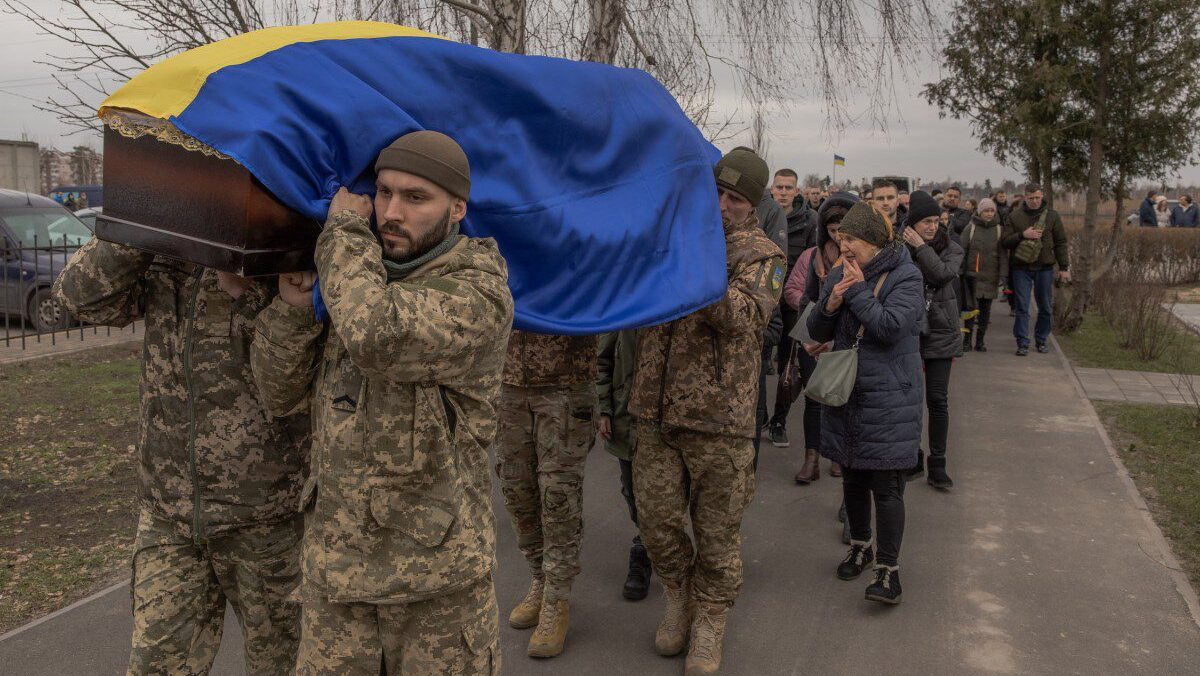
Ukrainian soldiers carry the coffin of late Ukrainian serviceman Andriy Katanenko, 39, who was killed near Avdiivka, during a funeral ceremony in Bucha, northwest of Kyiv on February 24, 2024, on the second anniversary of Russia’s invasion of Ukraine.
Photo: Roman PILIPEY / AFP
Ukrainian President Volodymyr Zelensky has signed into law a measure lowering the compulsory military service age from 27 to 25. Ukraine is in dire need of more soldiers as experts predict possible Russian territorial gains in 2024.
The country has struggled to bolster its army in its fight against Russian forces that invaded more than two years ago. Multiple efforts from lawmakers are designed to address the problem, including the recent decision to lower the conscription age—the age for serving in the army—to 25. Meanwhile, the Ukrainian Parliament is considering a bill that would also reduce the age for mobilisation—active participation in the ongoing war—from 27 to 25. The average age of current front-line infantry soldiers is widely reported as being around 43 years.
In December, Zelensky said that Ukraine’s military wants to mobilise up to 500,000 more troops. Ukrainian officials have estimated their armed forces number around 800,000, while Russian President Vladimir Putin recently declared 600,000 Russian troops are fighting in Ukraine.
According to a report by BBC Ukraine in November, approximately 650,000 Ukrainian men aged 18-60 have left Ukraine for Europe since the start of the war. Over half a million male refugees are currently residing in the 27 EU member states, as well as Switzerland, Liechtenstein, and Norway, many of whom are undocumented. Under Ukraine’s martial law, men between the ages of 18-60, with some exceptions, are not allowed to leave the country.
Ukraine launched a counteroffensive against Russian forces last summer but failed to make major gains, and fighting has reached a stalemate. In fact, Russia, which controls almost a fifth of Ukrainian territory, including the Crimea peninsula it annexed in 2014, has seen some successes on the battlefield this year.
5/ ISW continues to assess that Western-provided materiel continues to be the greatest deciding factor for the Ukrainian military’s ability to restore and augment its combat power.
— Institute for the Study of War (@TheStudyofWar) April 3, 2024
Russian Offensive Campaign Assessment, April 2, 2024: https://t.co/SeQly1AHWJ pic.twitter.com/0Zq2CZGp52
“Over the spring and summer, Russia is likely to mount a series of major attacks designed to inflict Ukrainian casualties, push defenders westward and expand its control of occupied territories,” writes the International Institute for Strategic Studies, a London-based think tank in its assessment. The Institute believes Russia can sustain its campaign for some time, as it has enough contract soldiers to sustain its force structure, and has also put its economy in a war setting, with total military spending now representing one-third of its national budget.
Supply of artillery ammunition, munitions ready to be used, and ballistic missiles from Iran and North Korea also shifts the balance of firepower against Ukraine, which is missing crucial weapons deliveries from its Western allies and faces basic shortages of arms and other materiel. Mobilisation has been a divisive issue in a nation exhausted by more than two years of war, and there have been a growing number of news reports of draft officers confronting men in the streets, in shopping centres, gyms, and even in swimming pools, to hand over their draft papers. Videos have circulated of armed recruiting officers threatening men and sometimes dragging them away.
